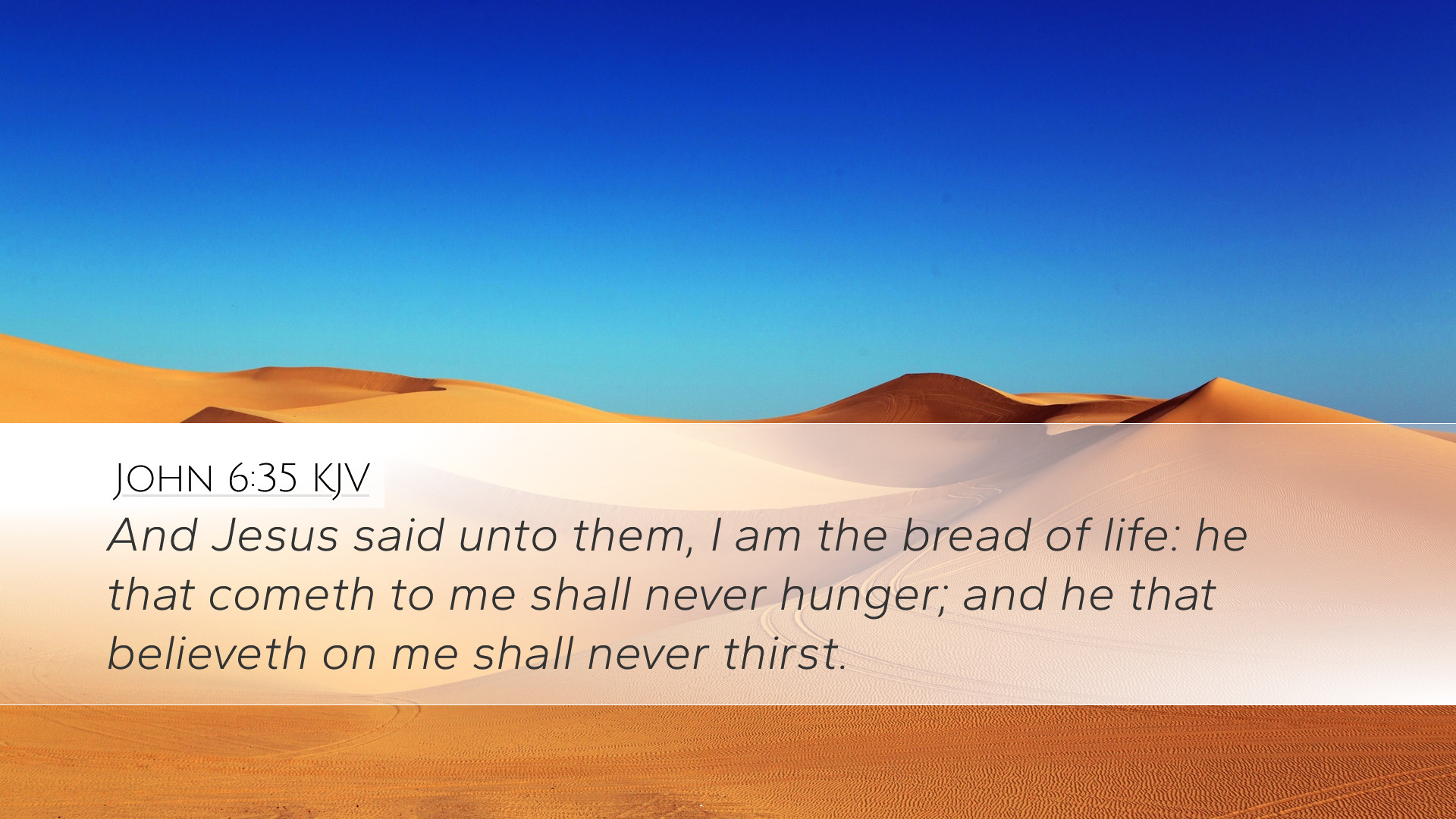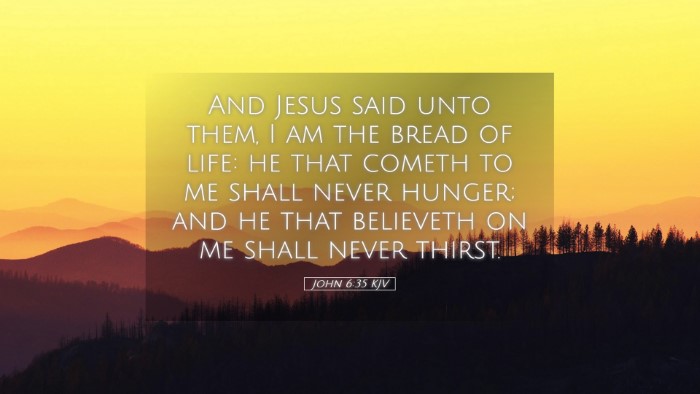Commentary on John 6:35
John 6:35 (KJV): “And Jesus said unto them, I am the bread of life: he that cometh to me shall never hunger; and he that believeth on me shall never thirst.”
Introduction
This verse is a profound declaration made by Jesus, positioning Himself as essential for spiritual sustenance. In the context of the discourse, Jesus identifies Himself as the 'bread of life,' a metaphor rich with theological significance.
The Metaphor of Bread
Matthew Henry’s Commentary emphasizes that bread signifies the sustenance of life, both physically and spiritually. Just as bread is a fundamental dietary staple, Christ emerges as the fundamental source of spiritual nourishment.
Albert Barnes elaborates on this by suggesting that bread represents the satisfaction of all human wants, a symbol of the provision and care that God affords through Christ. Jesus, in presenting Himself as the bread of life, assures us that all spiritual needs are met in Him.
The Promise of Satisfaction
The promise “he that cometh to me shall never hunger” speaks to the assurance of complete fulfillment for the believer. Adam Clarke points out that the term "hunger" in this context is both physical and spiritual. Jesus fulfills every believer's deepest desires and longings.
This verse addresses the human condition: a constant search for that which satisfies. Here, Christ declares that in Him, the search ends. He not only provides sustenance but guarantees a perpetual state of satisfaction.
Belief and Thirst
The latter part of the verse states, “he that believeth on me shall never thirst.” Henry suggests that thirst represents an insatiable longing in the human heart. In coming to Christ, the believer experiences an unquenchable satisfaction that transcends worldly pursuits.
Barnes further connects this idea with the relational aspect of faith. Belief in Jesus leads to a transformative relationship that quenches our spiritual thirst. This is not merely a promise of momentary relief but a lasting, eternal experience of fulfillment.
Contextual Significance
This saying from Jesus follows the miraculous feeding of the 5,000, where physical hunger was satisfied temporarily. Albert Barnes notes that Jesus uses this opportunity to shift the focus from the physical food to the spiritual nourishment necessary for eternal life.
Henry stresses that in the same way that bread sustains life, Christ’s teaching and sacrifice are vital for spiritual vitality. The immediate audience, likely impressed by the miracle, needed to understand that Jesus is the source of a far greater provision than mere bread.
Application for Believers
For pastors and theologians, this verse serves as a reminder to direct congregants' focus towards Christ as the essential source of life and sustenance. Clarke provides guidance that in the context of modern restlessness and spiritual malaise, pointing towards Christ as the bread of life can lead to profound spiritual renewal.
For students of the Bible, examining this text reveals the deep intertwining of physical and spiritual motifs in Scripture. The concepts of hunger and thirst serve as avenues through which the faithful can explore their personal relationship with Christ and their need for His constant presence.
Theological Implications
Theologically, John 6:35 encapsulates Christ’s dual nature as both fully human and fully divine. Henry remarks that unlike earthly bread that provides temporary sustenance, Jesus offers eternal life. This significantly challenges believers to evaluate their dependency on physical versus spiritual nourishments.
Barnes argues that understanding Christ as the bread of life involves recognizing the strength found in His Word and work. Believers are called to partake in this bread through faith, ensuring their spiritual vitality amid a world fraught with distraction.
Conclusion
In conclusion, John 6:35 stands as a profound statement of faith and promise. By referring to Himself as the bread of life, Jesus offers not just sustenance but full and eternal satisfaction. Clarke highlights that believers are invited to partake in this bread and experience a transformation that satisfies the deepest longings of the heart.
Ultimately, pastors, students, and scholars find that this verse is an anchor for understanding the nature of Christ and His immeasurable provisions for those who seek Him earnestly.


